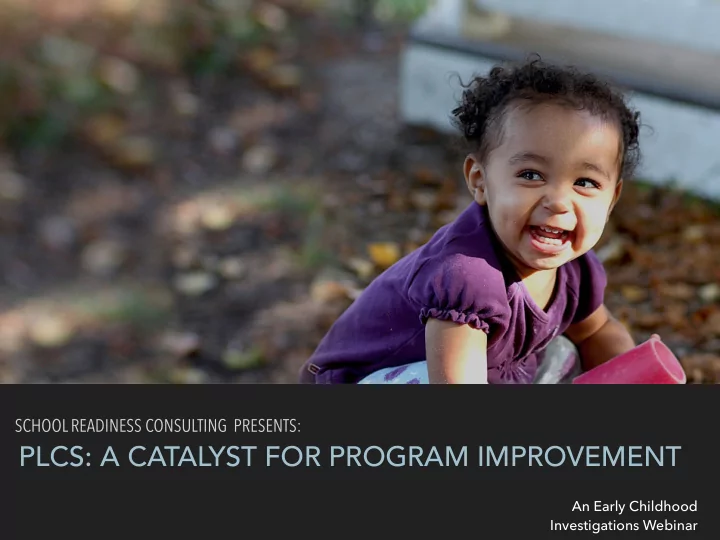

SCHOOL READINESS CONSULTING PRESENTS: PLCS: A CATALYST FOR PROGRAM IMPROVEMENT An Early Childhood Investigations Webinar
Lindsey Allard Agnamba, Ed. D. Katherine Rowell, M. Ed. Founder and Executive Director Practice Manager School Readiness Consulting School Readiness Consulting PRESENTATION TEAM
POLL
OBJECTIVES PARTICIPANTS WILL: ➤ Develop new perspectives on creating partnerships needed to effectively implement a director-led professional learning community(plc) ➤ Understand the value of a professional learning community for program directors participating in Quality Rating Improvement System efforts ➤ Examine the development and implementation of a plc while recognizing the potential barriers and identifying strategies for successful integration
HIGH STAKES ▸ On a a given day, about 12 million children under the age of five will need a safe place to go and someone loving to care for them. ▸ The critical period of language learning begins to close around five years old and ends around puberty. ▸ Disadvantages (including low quality early learning experiences) that begin early in life have long lasting effects on academic performance.
Teachers Know Best: Teachers’ Views on Professional Development Bill and Melinda Gates Foundation, 2014
PROFESSIONAL LEARNING COMMUNITY RESEARCH AND CORE ELEMENTS
PROFESSIONAL LEARNING COMMUNITIES The most promising strategy for sustained, substantive school improvement is building the capacity of school personnel to function as a professional learning community. (And,) the path to change in the classroom lies within and through professional learning communities. (Mclaughlin, 1995)
A DEFINITION OF A PLC: EDUCATORS COMMITTED TO WORKING TOGETHER COLLABORATIVELY IN ONGOING PROCESSES OF COLLECTIVE INQUIRY AND ACTIVE RESEARCH IN ORDER TO ACHIEVE BETTER RESULTS FOR THE STUDENTS THEY SERVE… KEY TO IMPROVED LEARNING FOR STUDENTS IS CONTINUOUS, JOB- EMBEDDED LEARNING FOR EDUCATORS DuFour, DuFour, Eaker, Many-2006
CORE ELEMENTS OF A PLC TO PROMOTE SUCCESS ▸ Children are at the center of the work ▸ Shared goals that are aligned across the organization ▸ Data driven inquiry ▸ Teachers and Leaders are learning and improving practice ▸ Job-embedded learning ▸ Support and resources come from leadership
POLL
PROFESSIONAL LEARNING COMMUNITIES TAKE PLACE… ▸ Once a month ▸ When you can find time on the schedule ▸ Within the routine work day; plcs are job-embedded
POLL
PROFESSIONAL LEARNING COMMUNITIES FOCUS ON… ▸ What participants are interested in ▸ What children need ▸ What parents want programs to work on
POLL
A PROGRAM LEADER’S ROLE IN A PLC IS THAT OF … ▸ Organizer ▸ Lead learner ▸ Spectator
APPLICATION IN ECE Lead Learner Prioritize instructional leadership which is learning focused , learning for both students and adults, and learning which is measured by Teacher improvement in instruction and in the quality of (children’s) learning….it resides within a team of leaders of which the (program director) serves Child as the ‘leader of leaders.’ (Center for Educational Leadership)
PROFESSIONAL LEARNING COMMUNITIES AN EXAMPLE FROM MILE HIGH EARLY LEARNING
JESSICA SCHERDEN, PROGRAM DIRECTOR OF EDNA OLIVER MILE HIGH EARLY LEARNING CENTERS DENVER, CO
WHAT DROVE MILE HIGH EARLY LEARNING TO START A DIRECTOR PLC? Interview Question
DESCRIBE THE CURRENT WORK OF THE DIRECTOR PLC AT MHEL Interview Question
WHAT CONNECTIONS DO YOU SEE BETWEEN THIS PLC WORK & ONGOING QUALITY IMPROVEMENT EFFORTS? Interview Question
WHAT HAVE BEEN THE CHALLENGES AND SUCCESSES OF A DIRECTOR PLC? Interview Question
PROFESSIONAL LEARNING COMMUNITIES ESSENTIAL SHIFTS UNIQUE TO EARLY LEARNING LEADERS
WHY BE PART OF A PLC? 1. Shared responsibility for the development of all children and their success. 2. Reduced isolation. 3. Powerful adult learning that shifts focus from teaching to learning. 4. Increased understanding of content. 5. Be professionally renewed. 6. Increased likelihood to inspire. 7. Other? Adapted from Issues ...about Change Volume 6, Number 1, Professional Learning Communities: What Are They And Why Are They Important? (1997)
JESSICA SCHERDEN, PR0GRAM DIRECTOR AT EDNA OLIVER PERSPECTIVE ON MAKING A SHIFT
DESCRIBE YOUR EXPERIENCE WORKING IN A DIRECTOR PLC? Interview Question
DESCRIBE THE PROCESS OF DEVELOPING THE RUBRIC WITH YOUR COLLEAGUES? Interview Question
HOW DO YOU DEFINE INSTRUCTIONAL LEADERSHIP? Interview Question
HOW DOES YOUR INSTRUCTIONAL LEADERSHIP SUPPORT THE NOTION OF SHARING RESPONSIBILITY FOR ALL CHILDREN? Interview Question
POLL
INSTRUCTIONAL LEADERSHIP INCLUDES TASKS AND ACTIVITIES IN THE FOLLOWING AREAS: ▸ Curriculum, Instruction and Assessment ▸ Professional Learning ▸ Hiring and on boarding ▸ Ongoing staff support(maintaining ratios, breaks, planning time) ▸ All of the above
CLOSING THOUGHTS ▸ Program director roles are shifting to include an elevated role as instructional leader ▸ Lead by example ▸ Keep children at the center of the work ▸ Directors need a strong learning community of their own to make this shift and sustain ongoing quality improvement efforts
THANK YOU! PLEASE KEEP IN TOUCH… School Readiness Consulting ▸ schoolreadinessconsulting.com ▸ rowell@schoolreadinessconsulting.com ▸ allard@schoolreadinessconsulting.com ▸ facebook.com/schoolreadinessconsulting ▸ @SRCtweets
Recommend
More recommend